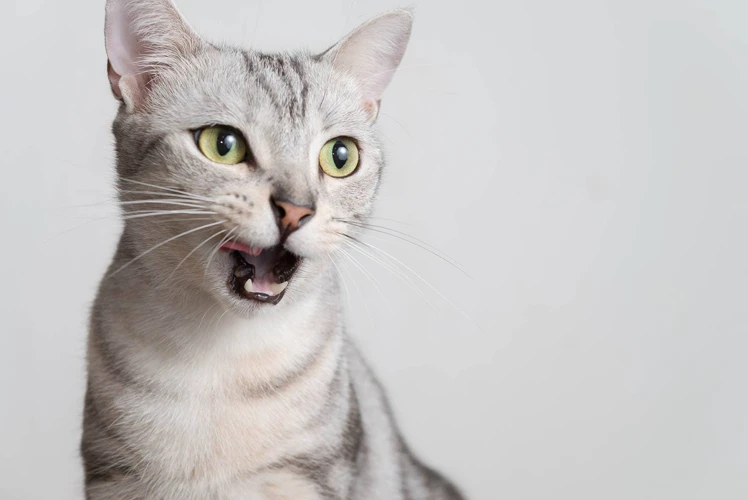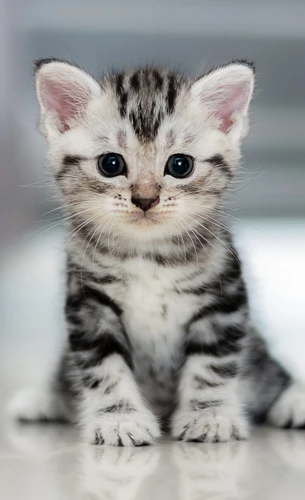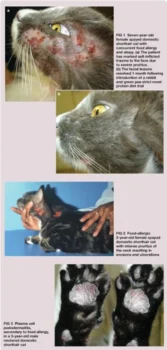It’s no secret that American Shorthair Cats are a popular breed among pet owners. These cuddly felines are known for their laid-back temperament and playful personalities. However, just like any other animal, these cats can suffer from various health issues, including allergies. If you’re a cat owner, you may have noticed some odd behaviors or physical symptoms in your furry friend, and you’re not sure what’s causing them. Don’t worry; this article will provide you with a comprehensive guide on the causes, symptoms, and treatments of allergies in American Shorthair Cats. So, grab your notepad and let’s dive in!
Causes of Allergies in American Shorthair Cats

Understanding the causes of allergies in American Shorthair Cats is crucial to managing the condition effectively. Allergies are common in American Shorthair Cats, affecting their skin, respiratory system, and digestive system. Identifying the root cause of your cat’s allergies could be challenging, but with a thorough understanding of common allergens and food sensitivities, you can develop an effective management strategy. In this section, we’ll take a closer look at the causes of allergies in American Shorthair Cats and explore some effective treatment options to help alleviate your furry friend’s symptoms. If you’re interested in learning more about your cat’s overall health, check out our article on the importance of regular wellness checkups for cats.
Common Allergens
Common allergens that affect American Shorthair cats may include pollen, mold, dust, and dander. These allergens are commonly found indoors and outdoors. Additionally, certain household cleaning products, perfumes, and cigarette smoke are known to trigger allergies in cats.
Some American Shorthair cats may also have a reaction to their food, which can result in allergy symptoms. The most common food allergens in cats include beef, dairy, fish, and poultry. It is important to note that food allergies may not develop until a cat is several years old, so it is important to monitor their eating habits and watch for any changes in behavior or symptoms.
Another allergen that can affect American Shorthair cats is flea saliva. Some cats can have an allergic reaction to the saliva when a flea bites them. This can cause excessive scratching, hair loss, and skin irritation. Preventative measures, such as using flea medications, can help reduce the risk of flea allergies.
It is important to identify the source of the allergen to effectively manage and treat allergies in American Shorthair cats. If you suspect your cat has an allergy, consult with a veterinarian to determine the best course of action. If left untreated, allergies can lead to more severe health issues in cats, such as respiratory infections and chronic skin conditions.
Internal link: feline infectious diseases in American Shorthair cats.
Food Sensitivities
Food sensitivities can also lead to allergies in American Shorthair cats. This is when the cat’s immune system reacts adversely to specific food ingredients, particularly protein sources like chicken, fish and beef. A food sensitivity can develop at any age, and it’s not uncommon for cats to suddenly develop one out of the blue.
The common signs of food sensitivity in American Shorthair cats include chronic ear infections, itchy skin, vomiting, and diarrhea. Some cats may even develop a more severe condition known as inflammatory bowel disease (IBD). American Shorthair cat owners should monitor their pets for these symptoms and consult a veterinarian if they notice their cat showing any of these signs.
Preventing allergies in American Shorthair cats caused by food sensitivities is relatively easy with proper nutrition. One way owners can manage this is by putting their cat on a hypoallergenic or limited ingredient diet. This type of diet eliminates common allergens, such as chicken, beef, and fish, and replaces them with alternative protein sources like duck, rabbit, or venison. It’s important to note that while these diets can be effective, they should only be prescribed by a veterinarian.
Another way to prevent food sensitivities is to avoid feeding your cat low-quality, commercial cat food. It’s essential to read the labels carefully and choose high-quality, grain-free foods without artificial preservatives or coloring. By doing this, you’ll be ensuring that your cat gets all the necessary nutrients they need to stay healthy while avoiding potential allergens.
It’s worth noting that food sensitivities can sometimes co-occur with other health conditions, such as Feline Lower Urinary Tract Disease (FLUTD) or dental problems. If your American Shorthair cat is experiencing multiple health issues, it’s essential to seek out professional veterinary care to address all the problems. By taking preventative steps, you can help your cat avoid developing food sensitivities that may lead to allergies and other health problems.
One thing to keep in mind is that obesity can also lead to food sensitivities. So, it’s important to prevent obesity by following a well-rounded diet and exercise routine. Owners can take steps to prevent obesity by providing their cats with a healthy diet, feeding them on a regular schedule, and encouraging playtime and activity. By following these steps, owners can help their American Shorthair cats stay healthy and free from food sensitivities.
Sources:
Feline Lower Urinary Tract Disease in American Shorthair Cats
Preventing Obesity in American Shorthair Cats: Tips and Strategies
Spots Dental Problems in Cats
Symptoms of Allergies in American Shorthair Cats

It can be difficult to identify whether your American Shorthair cat is suffering from allergies, but it’s important to watch out for any signs that may indicate they are allergic to something in their environment. Allergies in American Shorthair cats can lead to a variety of uncomfortable symptoms, both physical and behavioral. Monitoring your cat’s behavior and physical condition is crucial in identifying allergies early on. If left untreated, allergies can lead to more serious health problems and make your cat’s life miserable. Understanding the possible symptoms of allergies in American Shorthair cats is the first step in ensuring your adorable feline friend is always in good health.
Physical Symptoms
American Shorthair cats may exhibit various physical symptoms to indicate an allergic reaction. One symptom is dermatitis, which is an inflamed, itchy skin caused by allergies that can cause redness, rashes, and hair loss. This can also result in hot spots where the cat excessively licks or scratches themselves. Another symptom is sneezing and conjunctivitis, which is the inflammation of the eyes. This results in excessive tearing, swelling, and itchiness, making it painful for the cat to open its eyes.
Cats with allergies may also develop respiratory problems, particularly asthma. This leads to inflammation in their lungs, causing wheezing, coughing, and difficulty in breathing. It’s crucial to manage asthmatic cats, and we have an article on asthmatic cat management tips to help you take care of your furry friend.
Another physical symptom is ear infections, which can be caused by food allergies, bacterial infections, and fungus. This can result in constant shaking of the head, discharge from the ear, and a strong odor. It’s essential to consult with a veterinarian to identify the appropriate treatment plan.
Lastly, some cats may develop digestive problems due to allergies, causing them to have diarrhea, vomiting, and flatulence. A proper diet and an elimination diet may help in diagnosing and treating food allergies. Make sure to consult with your veterinarian before changing your cat’s diet.
It’s crucial to identify physical symptoms in your American Shorthair cat as they can indicate various allergic reactions. If you notice any of these symptoms, take your cat to a professional veterinarian for a checkup. Regular wellness checkups are also crucial to ensure your cat is healthy, and we have an article on the importance of regular wellness checkups for cats.
Behavioral Symptoms
Cats with allergies can exhibit a range of behavioral symptoms, which can be difficult to link to an allergy at first glance. However, if your American Shorthair cat is experiencing an unexplained change in behavior, it’s worth considering whether their symptoms may be related to an allergic reaction.
- Excessive scratching: This is a common behavioral symptom of allergies in cats. If you notice your American Shorthair scratching more frequently than usual, pay attention to the areas of their body that they are scratching, as this can give you a clue as to what is causing the allergic reaction.
- Licking, biting, or chewing: If your American Shorthair is constantly licking, biting, or chewing at their skin, this could also be a sign of allergies. This behavior is often a result of the itching caused by the allergies.
- Changes in grooming habits: Cats are known for keeping themselves clean, but if your American Shorthair suddenly stops grooming themselves or their coat becomes dull and unkempt, it could be a sign of an underlying allergy.
- Unusual vocalizations: Some cats will exhibit unusual vocalizations, such as constant meowing, growling, or hissing when they are experiencing an allergic reaction.
- Aggression: Allergies can also cause changes in temperament. If your American Shorthair becomes unusually aggressive, it may be due to the discomfort and pain caused by the allergic reaction.
If you notice any of these behavioral symptoms in your American Shorthair cat, it’s important to take them to the veterinarian for diagnosis and treatment. Although allergies can be difficult to diagnose, a veterinarian can help rule out other potential causes for the symptoms. If left untreated, allergies can result in secondary infections and exacerbate pre-existing conditions. Regular check-ups with the vet for your American Shorthair cat can help identify allergies before symptoms arise, so consider making this a part of your cat’s routine healthcare.
Treatments for Allergies in American Shorthair Cats

Dealing with allergies in American Shorthair cats can be a tricky and frustrating process for both the pet and their owner. However, there are several different treatments that can help alleviate allergic symptoms and make your cat feel more comfortable. From medications to elimination diets to immunotherapy, this section will explore various techniques that can be used to treat allergies in American Shorthair cats. So, let’s dive in and find out how to help your beloved furry friend!
Medications
When it comes to treating allergies in American Shorthair cats, medication can be an effective option. Here are some common medications used for treating allergies:
| Type of Medication | How it works | Examples |
|---|---|---|
| Antihistamines | Block histamines, which are released during an allergic reaction and cause symptoms like itching and sneezing. | Benadryl, Claritin, Zyrtec |
| Corticosteroids | Reduce inflammation and suppress the immune system, which can help with severe allergic reactions. | Prednisone, dexamethasone, hydrocortisone |
| Immunosuppressants | Suppress the immune system to prevent allergic reactions. | Cyclosporine, azathioprine, cyclophosphamide |
It’s important to note that these medications should only be used under the guidance of a veterinarian. They can have side effects and may not be suitable for all cats. Additionally, while medication can help manage the symptoms of allergies, it’s not a cure. Allergies may still persist even with the use of medication.
If you’re interested in learning about other health issues that can affect American Shorthair cats, check out our articles on feline arthritis management, managing hairballs, and treating dehydration.
Elimination Diets
One potential treatment option for American Shorthair cats who suffer from allergies is an elimination diet. Essentially, this involves identifying and removing any foods from the cat’s diet that may be causing an allergic reaction. This can be a tricky process, as it may take some time to determine which specific ingredient(s) are causing the issue.
Here’s a step-by-step breakdown of how an elimination diet may work for your cat:
- Consult with your veterinarian: Before embarking on an elimination diet, it’s important to consult with your veterinarian. They can help you determine if this is the best course of action for your pet and provide guidance on how to proceed.
- Choose a hypoallergenic diet: Your vet may recommend a specific type of cat food that is designed to minimize the risk of triggering an allergic reaction. These may contain novel proteins like venison or rabbit, or may be made with hydrolyzed protein, which breaks the protein down into smaller pieces that are less likely to cause an allergy.
- Stick to the diet: Your cat will need to stay on the hypoallergenic diet for at least 8-10 weeks to determine if it is effective. During this time, it is important to avoid any other foods or treats that could interfere with the process.
- Reintroduce foods: After the elimination period is up, you will slowly begin to reintroduce other foods into your cat’s diet one at a time. This will help you identify any allergies or sensitivities that may be present.
- Monitor for reactions: As you reintroduce foods, it’s important to carefully monitor your cat for any signs of an allergic reaction. If a reaction occurs, you will need to remove that food from your cat’s diet and continue the process with other potential allergens.
While elimination diets can be effective for some American Shorthair cats, they can also be time-consuming and difficult to manage. It’s important to work closely with your veterinarian throughout the process to ensure the best possible outcome.
Immunotherapy
Immunotherapy is a treatment that can provide long-term relief for American Shorthair cats with allergies. This treatment involves exposing cats to small amounts of allergens over time, which helps build up their immune system’s tolerance to these triggers.
The benefits of immunotherapy include:
- Reduced need for medication
- Long-term relief
- Reduced risk of future allergic reactions
Immunotherapy typically involves a series of injections given at regular intervals. The injections gradually increase in strength until they are at a level that can effectively desensitize the cat’s immune system. The duration of the treatment can vary depending on the severity of the cat’s allergies and their individual response to the injections.
It is important to note that immunotherapy:
- Requires a diagnosis of specific allergens
- May not be effective for all cats
- Requires regular visits to the veterinarian
If your cat has allergies, talk to your veterinarian about whether immunotherapy may be a good option for them. They can perform allergy testing to identify the specific triggers and create a customized treatment plan. With proper treatment and management, American Shorthair cats with allergies can lead happy, healthy lives.
Prevention of Allergies in American Shorthair Cats
As the saying goes, prevention is better than cure and this proverb is equally applicable to allergies in American Shorthair Cats. By taking a few precautions, cat owners can prevent their pets from developing allergies and save themselves the trouble of dealing with allergies.
Regular Grooming: Keeping your American Shorthair’s fur clean and well-maintained can help prevent allergic reactions. Regular grooming includes brushing their fur, bathing them, and trimming their nails. This can reduce the amount of allergens in the cat’s environment.
Clean Environment: Keep your cat’s living space free of dust, pollen, and other allergens that could trigger an allergic reaction. Clean their litter box regularly and vacuum your home frequently to minimize the buildup of allergens. Don’t forget to wash your cat’s bedding in hot water to kill any allergens that might be present.
High-Quality Food: Feed your American Shorthair a high-quality diet free from artificial colors, flavors, and preservatives. Some cats are allergic to specific ingredients, such as grains, so it is essential to read the label carefully and choose a food that meets their nutritional needs. Providing a healthy diet can strengthen the immune system and reduce the risk of allergies in the long run.
Regular Visits to the Veterinarian: Regular checkups with the veterinarian can catch any allergies or other health issues early on. This early detection can help in preventing allergies. Your veterinarian can also provide you with advice and guidance on the right kind of diet and grooming routine for your American Shorthair.
Taking preventative measures is crucial in preventing allergies in American Shorthair cats. Proper grooming, a clean environment, high-quality food, and regular vet visits all play a significant role in preventing allergies. These small steps can go a long way in ensuring your pet’s good health and wellbeing.
Conclusion
After learning about the causes, symptoms, and treatments of allergies in American Shorthair Cats, it’s clear that these conditions can have a significant impact on feline health and well-being. As pet owners, it’s our responsibility to be aware of the signs of allergies in our cats and seek appropriate treatment when necessary.
Remember that prevention is key. While some allergies may be impossible to prevent, there are steps we can take to reduce the risk. This includes avoiding common allergens in our homes, carefully selecting the foods we provide to our cats, and regularly cleaning their living spaces.
If you suspect that your American Shorthair cat is experiencing allergies, it’s important to seek veterinary care as soon as possible. Your veterinarian can perform tests to determine the specific allergen causing your cat’s symptoms and recommend appropriate treatments.
Fortunately, with effective management and treatment, many cats with allergies live long and happy lives. By being aware of the signs and seeking veterinary care when necessary, we can help our feline friends enjoy the best possible health and quality of life.
Frequently Asked Questions
1. What are the most common allergens for American Shorthair Cats?
The most common allergens for American Shorthair Cats are dust mites, pollen, mold, and certain foods.
2. How do I know if my American Shorthair Cat has allergies?
Some common symptoms of allergies in American Shorthair Cats include scratching, sneezing, coughing, and gastrointestinal issues.
3. Can American Shorthair Cats develop allergies later in life?
Yes, American Shorthair Cats can develop allergies at any point in their lives, typically due to changes in their environment or diet.
4. Can I give my American Shorthair Cat over-the-counter allergy medication?
No, it is not recommended to give your American Shorthair Cat over-the-counter allergy medication without consulting with a veterinarian first.
5. How can I prevent allergies in my American Shorthair Cat?
You can prevent allergies in your American Shorthair Cat by regularly cleaning their bedding and living areas, using air filters, and avoiding food that may trigger allergies.
6. Can American Shorthair Cats be allergic to certain types of litter?
Yes, American Shorthair Cats can be allergic to certain types of litter, including those made from clay or scented ingredients. It is recommended to use unscented, natural litter options.
7. What is the best treatment for allergies in American Shorthair Cats?
The best treatment for allergies in American Shorthair Cats includes medications prescribed by a veterinarian, elimination diets, and immunotherapy.
8. Are there any breeds of cats that are less prone to allergies?
While no cat breed is completely immune to allergies, some breeds, such as the Sphynx and Devon Rex, are less likely to experience allergies due to their lack of fur.
9. Can American Shorthair Cats be allergic to human dander?
It is rare for American Shorthair Cats to be allergic to human dander, but it is possible. If you suspect your cat is allergic to human dander, consult with a veterinarian.
10. Is there a specific diet that can help manage my American Shorthair Cat’s allergies?
Yes, an elimination diet that removes potential allergens from your American Shorthair Cat’s diet can help manage their allergies. Consult with a veterinarian for guidance on the best diet for your cat.







